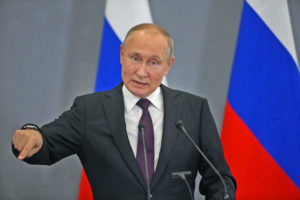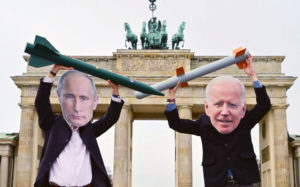Even as “kamikaze” drones rain down on Kyiv, the mood over Ukraine is shifting in the US. Between May and September, the share of Americans who are extremely or very concerned about a Ukrainian defeat fell from 55% to 38%. Among Republicans and Republican-leaning independents, 32% say the US is providing too much support for the war — up from 9% in March.
But rifts are emerging within the American establishment as well. The list of high-profile media and policy figures who are starting to question the wisdom of the US strategy in the conflict grows longer every day.
Why is the US administration continuing to pour tens of billions into a war that is ravaging Ukraine and causing thousands of deaths (and triggering massive collateral damage globally) when, according to the Washington Post, “privately, US officials say neither Russia nor Ukraine is capable of winning the war outright”? If so, why is the US prolonging the bloodshed and destruction, pledging to support Ukraine “for as long as it takes”, rather than working towards a diplomatic solution that, barring nuclear war, is the only possible outcome anyway? The madness of this policy has become even more apparent in recent weeks, as fighting on both sides has continued to dangerously escalate — with Biden himself warning of the very real possibility of a nuclear “Armageddon”.
As Josh Hammer wrote in Newsweek, the time has come for the US to abandon its overly simplified position of supporting Zelenskyy’s dream of retaking “every square inch of territory in the Donbas and Crimea from its nuclear-armed adversary, seemingly no matter the cost to the US taxpayer”. At this stage in the conflict, Hammer notes, it is not in America’s interests to endorse all of Ukraine’s unrealistic territorial claims. Rather than semi-permanent war and destabilisation, what is needed is “de-escalation, detente, and peace”. Mike Mullen, who served as the chairman of the Joint Chiefs of staff for George W. Bush and Barack Obama, put it even more bluntly: “As is typical in any war, it’s got to end and usually there are negotiations associated with that. The sooner the better, as far as I’m concerned.”
But this, of course, means facing down Zelenskyy’s absolutist stance — which includes refusing to come to the negotiating table until Putin is removed from power, continuing to demand Ukraine’s immediate accession to Nato, and refusing to compromise on the recently annexed regions of Luhansk and Donetsk, or even on Crimea. Interestingly, the same concerns were even voiced by David E. Sanger, the chief Washington correspondent for the traditionally pro-war New York Times, who wrote: “No one in the [Biden] administration wants to suggest, in public or private, that the government of President Volodymyr Zelenskyy should avoid chasing Russian troops out of every corner of Ukraine, back to the borders that existed Feb. 23, the day before the invasion began. But behind closed doors, some Western diplomats and military officials say, that is exactly the conversation that may have to happen.”
A possible solution in this sense was articulated by Elon Musk — a member of the US establishment himself, albeit an eccentric one — in a hugely controversial tweet in which he offered his idea for a peace deal, which involved re-running referendums on annexation under UN supervision in Russia-occupied areas; recognising Russian sovereignty over annexed Crimea; and giving Ukraine neutral status.
Musk’s proposal echoes the peace plan put forward by Henry Kissinger earlier this summer. Kissinger warned that if negotiations did not restart by the end of July, then we risked “upheavals and tensions that will not be easily overcome” — such as those that have now come to fruition.
Several military analysts agree that the conflict has reached a stage where the situation could easily spiral out of control, regardless of what the political or even military leadership of the two countries may want. They point to the fact that during the 1962 Cuban missile crisis, nuclear war was avoided not only because of skilful diplomacy, but also, and perhaps even more important, due to sheer luck — such as when a Soviet submarine captain, who believed the war had begun, decided to fire his nuclear torpedo at US ships, but was convinced otherwise by a fellow officer; or when US forces in Okinawa received a mistaken order to fire 32 nuclear missiles on Russian targets, again only being stopped by one quick-thinking captain.
The lesson from the only nuclear confrontation the world has ever known is therefore clear: the longer the tension lasts, the greater the risk of accidents and miscalculations. Hence the need for de-escalation. As David Ignatius observed in the Washington Post: “Leaders must think now with the same combination of toughness and creativity that President John F. Kennedy showed during the Cuban missile crisis in 1962. That means drawing a firm line — Kennedy never wavered on his demand that Soviet missiles be removed from Cuba — but it also means looking for ways to de-escalate.”
Ignatius also highlighted an uncomfortable truth: that the refusal to engage in any diplomatic process has, so far, come from Ukraine, and even more so from the US (and UK) — not Russia. On the contrary, Ignatius recalled that “Russia had been prepared for a ‘peaceful settlement’ in the negotiations brokered by Turkey in Istanbul in late March, but that Ukraine and the West had balked”. Then, in April, according to multiple US officials, Russia and Ukraine had agreed on a tentative deal to end the war — only for Boris Johnson to fly to Kyiv to bring the negotiations to an end, according to Ukrainian pro-Western sources. This raises several questions: why did Western leaders want to stop Kyiv from signing a seemingly good deal with Moscow? And how many lives might have been saved, on both sides, if the peace talks hadn’t been derailed?
That said, Ignatius, along with others, interprets Biden’s recent “Armageddon” speech as a signal that the President may finally be pivoting towards the need for a diplomatic solution. The fact that Biden hasn’t ruled out the possibility of meeting Putin at next month’s G20 meeting in Bali — an option he wasn’t willing to consider until recently — also indicates a potential change of strategy on the US administration’s behalf.
But if this is the case, much will depend on Biden’s ability to stand up to the powerful forces of the US military-industrial complex pushing for the continuation and escalation of the war (as Kennedy had to do during the Cuban missile crisis). Some are even suggesting that the increasingly brazen attacks against Russia — the recent bombing of the bridge connecting mainland Russia to Crimea, likely at the hands of the Ukraine’s SBU security service, for example — might be attempts by America’s pro-war faction to escalate the conflict.
After all, how realistic is it, as the former congressman Ron Paul asks, to assume that the Ukrainian government and intelligence services were able to conduct these operations behind America’s back? This leaves a couple of possibilities: either the Biden administration is fully on board with these actions, and supports the escalation; or there are elements actively working against the administration to derail any diplomatic solution — it certainly wouldn’t be the first time sections of the US intelligence had gone rogue. Of course, there is also the third possibility: the US has completely lost control of the Ukrainians, who are now engaging in terrorist activities behind the US’s back; it wouldn’t be the first time that had happened either, if we were to consider America’s role in the birth of al-Qaeda, for example.
All three prospects are equally terrifying. Whatever the case, the pro-war consensus is weakening, and that represents an opportunity. Now is the time for everyone who believes in a diplomatic solution to the conflict to speak out — and to put pressure on their leaders to stop the madness.
Disclaimer
Some of the posts we share are controversial and we do not necessarily agree with them in the whole extend. Sometimes we agree with the content or part of it but we do not agree with the narration or language. Nevertheless we find them somehow interesting, valuable and/or informative or we share them, because we strongly believe in freedom of speech, free press and journalism. We strongly encourage you to have a critical approach to all the content, do your own research and analysis to build your own opinion.
We would be glad to have your feedback.
Source: UnHerd Read the original article here: https://unherd.com/




